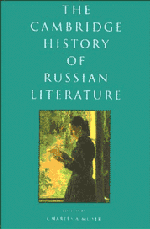Book contents
- Frontmatter
- 1 The literature of old Russia, 988–1730
- 2 The eighteenth century: neoclassicism and the Enlightenment, 1730–90
- 3 The transition to the modern age: sentimentalism and preromanticism, 1790–1820
- 4 The nineteenth century: romanticism, 1820–40
- 5 The nineteenth century: the natural school and its aftermath, 1840–55
- 6 The nineteenth century: the age of realism, 1855–80
- 7 The nineteenth century: between realism and modernism, 1880–95
- 8 Turn of a century: modernism, 1895–1925
- 9 The twentieth century: the era of socialist realism, 1925–53
- 10 The twentieth century: in search of new ways, 1953–80
- 11 Afterword: Russian literature in the 1980s
- Bibliography
9 - The twentieth century: the era of socialist realism, 1925–53
Published online by Cambridge University Press: 28 March 2008
- Frontmatter
- 1 The literature of old Russia, 988–1730
- 2 The eighteenth century: neoclassicism and the Enlightenment, 1730–90
- 3 The transition to the modern age: sentimentalism and preromanticism, 1790–1820
- 4 The nineteenth century: romanticism, 1820–40
- 5 The nineteenth century: the natural school and its aftermath, 1840–55
- 6 The nineteenth century: the age of realism, 1855–80
- 7 The nineteenth century: between realism and modernism, 1880–95
- 8 Turn of a century: modernism, 1895–1925
- 9 The twentieth century: the era of socialist realism, 1925–53
- 10 The twentieth century: in search of new ways, 1953–80
- 11 Afterword: Russian literature in the 1980s
- Bibliography
Summary
If the year which begins this period – 1925 – has both literary and political significance, as the year when the newly established communist regime asserted its authority over literature and culture, the ending date is primarily of political significance: it is the year of Joseph Stalin’s death. A political date is quite appropriate to close this era of Russian literature, during which literature and politics were more intimately interconnected than at any other time during the entire span of Russian literary history.
The political pressures of the early Soviet era brought about the division of Russian literature into two major if unequal parts: the principal one of Russian literature within the Soviet Union, and the lesser one of the “first wave” of the emigration which began to assume definite form around 1925. When the first wave later subsided – as some writers returned to the Soviet Union during the 1930s or after the Second World War, others died natural deaths or perished during that conflict, and the major centers of émigré culture between the wars were disrupted by that historical cataclysm – it was suddenly reinforced by the so-called “second wave” of the emigration resulting from the dislocations of that very conflict. The “second wave” contained few established writers, but it did provide a much larger audience than before for émigré literature, and boasted a number of talented people who managed to establish themselves as writers later on. The second wave of the emigration was more or less at its height at the time of Stalin’s death.
- Type
- Chapter
- Information
- The Cambridge History of Russian Literature , pp. 458 - 519Publisher: Cambridge University PressPrint publication year: 1992



